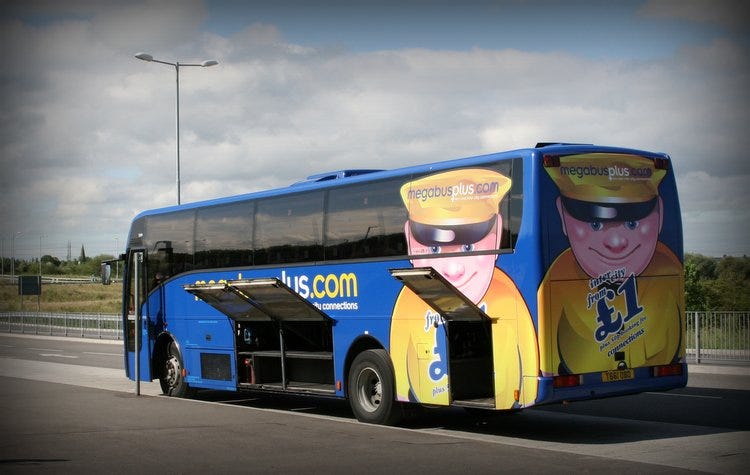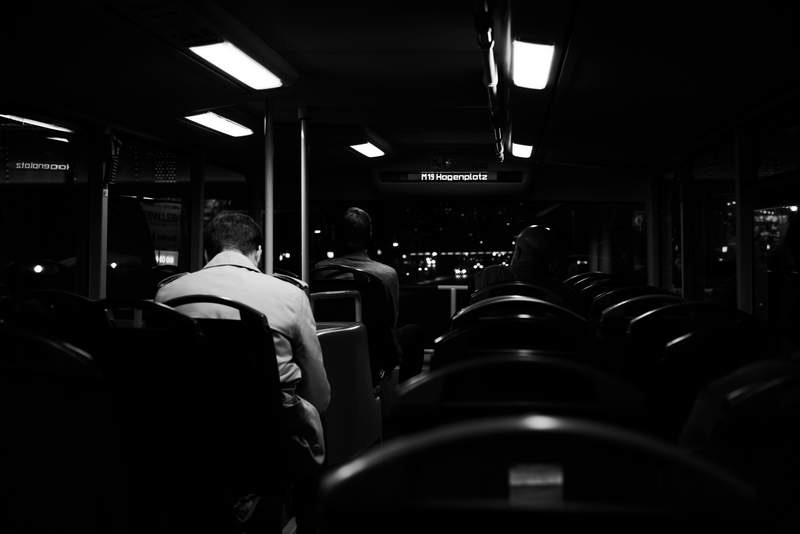Why, Boredom, Why?
"It was deeply frustrating and unsatisfying for him to be deeply bored by things he used to love.”
Hello! This is Everything Is Amazing, a newsletter about science and curiosity and the joy of becoming amazed when you take a closer look at the world around you…
And since the last edition was about having far too much water for comfort, let’s visit the opposite end of that scale - with my own voice as an alarming accompaniment.
TRANSCRIPT:
I’m halfway up Avenue de la Grand Armeé and I’m getting desperate.
This part of Paris doesn’t seem big on supermarkets or corner stores. All I want is somewhere that sells bottled water at 8pm – instead, I’ve got fashion boutiques, up-market auto shops and restaurants with the kinds of waiters that would take one look at me and ring the police. I’m a mess. It’s at least ten degrees too hot, I’m down to my last mouthful of water, my shirt is clammy with half-dried sweat, my head is pounding and my stomach feels ready to turn itself inside-out.
But I absolutely cannot stop moving. Not now.
I’m not sure what time my bus leaves. I need to be on it, yes . . . but this is about balancing nightmares. If the bus left the Porte Maillot Coach Park without me, that’d be awful, I’d be stranded in France – but at least I’d have time to find something to drink. If I’d stayed in that wasteland of parked coaches and hotly stinking gravel, I’d have boarded the bus with no water and a 14 hour journey ahead of me. I’d be licking condensation off the windows and looking at the chemical toilet with a speculative air.
In every way except financially, it would be worse than missing the bus. This is why I can’t go back yet.
I’m on the way to Spain by Megabus, from northern England, I’ve been on the move since 2am, and I’m not even halfway yet. But that’s OK – because the whole thing is costing me £25.
It’s worth pausing to investigate the phrase “OK” here.
Are you willing to inflict grinding discomfort upon yourself for the sake of a proper adventure?
Not just that tedious half-hour twiddling your thumbs on the tarmac before take-off, or your phone battery hitting 0% just before you finish that heartfelt post on social media you’ve been carefully phrasing for the last half-hour. No. I’m talking about the remarkable awfulness of long-distance bus travel here, which will scour away your will to live like nothing else.
With that in mind, here’s the sequence of events that got me the 1,100 miles from Leeds (Yorkshire, England) to Barcelona (Catalonia, Spain).
2.30am: Leeds. I’d arrived late afternoon on a Megabus from Hull (price: £1) and having had dinner in town, I then discover the Leeds bus station closes at 10pm, and can’t find anywhere open to spend the next few hours – so I hike half a mile out of town, clamber over a fence and go to sleep in a hedge, which is exactly as absurd and grim as it sounds. Four hours later, I splash some of the water I’ll desperately need later onto my face, and board my first bus of the journey.
8am: Victoria Coach Station, London. Gritty-eyed and concrete-brained, I stagger across the road into the Departures area, an overcrowded L-shaped corridor that gets more packed with people the closer you get towards the end. Megabus controls the final two stands, and the seats around them are all taken. In the hotness of summer, the air smells of halitosis and drains. It’s not a fun place to linger, so I don’t.
10.30am: The Megabus to Paris departs, and incredibly, I’m on it. (I nearly wasn’t, thanks to dozing off in the corner of a nearby Caffe Nero.) We sway towards the coast. How does a zero-budget bus service cross the Channel? Will we drive straight into the waves, like the London Duck Tour bus, or sprout wings like Chitty Chitty Bang Bang? Will we be shot from a cannon? It’s time to find out.
12 noon: Somewhere under the English Channel. It seems “shot from a cannon” was closest. We (passengers, bus and all) are in a 0.75km long steel tube masquerading as a train, and it’s propelling us from Folkestone to Coquelles. Each carriage is separated with air-tight doors: you have to press a button to break the seal, then give the doors an ENORMOUS SHOVE to get through. The train toilets are always at least three or four shoves in each direction, and offer the train’s sole source of entertainment. Within minutes it’s too hot on the bus (no engine = no air-con) so we congregate outside to have a communal non-experience. It’s efficient, fast (30 minutes) and completely inhuman.
(As I discover another time, coming back the other way was much nicer, as Megabus chose to use the passenger ferry – giving us all a stunning first-light view of the white cliffs of Dover.)
1pm: France, heading for Paris. Pro tip for Megabus users: don’t sit in the seats facing the window-covering logo of a friendly, unhealthy-looking man in a uniform I’ve never seen any Megabus driver wearing. Up close, it’s made of widely spaced plastic dots, giving you the headache-inducing compound vision of an insect if you try to stare out.
7pm: Paris. Quelle horreur. We’re not changing buses. This means all the hold luggage is staying put, so I can’t dig out my suitcase. No extra water, no food, no change of clothing. The bus leaves in…I’m not sure when it’s leaving. But I desperately need to find a shop that sells water. I sprint away into an uncertain future.
9.15pm: Well, I found water to buy. I found…what I hope is food. I’m still wearing the shirt I set off from Yorkshire in. But I’m on the bus and it’s currently leaving Paris! I celebrate by falling into a death-like sleep where I dream I work at a company that makes baths, and it’s my job to test them all. I wake up with sunlight streaming through…..oh no, I did it again. I’m in one of those window-seats. See the world like a housefly would.
6am: somewhere near Toulouse. My world is The Bus. There is nothing but The Bus. I was born here; I will die here. My entire reason for existing is to fill this seat. Soon I will expire and they will stop by the roadside and I will be gently lifted out and fed into the furnace at the heart of The Bus, to be converted into a few dozen more miles achieved on the road to infinity. This is what I’m for. My bag is filled with things that no longer make sense. Why do I need a “passport” when The Bus is all there is? I gnaw on a waxy mini-croissant and wait patiently for death.
11am: Estacio Nord Bus Station, Barcelona. I’m sitting on a station bench, sweating and trembling, my bags heaped around me, my senses overwhelmed. I am born again. What just happened? What did it all mean? I’ll never know, but I do know that I really need to pee, but alas, 11am is when they clean the toilets at the Estacio Nord bus station and I’ll just have to hunch over in agony until they’re done. Welcome to Catalonia, Mike.
Ten years later, all this is little more than a fever-dream. I know what happened, but I can barely remember what it felt like, and a bloody good job too.
But here’s one thing that’s really stuck in my mind. Once my Parisian water-sourcing ordeal was over and I’d had enough of a nap to feel uncomfortable again, that was when things started to get grim.
From around mid-afternoon onwards, when I realised I was running out of water in my hand-luggage, I was on a mission. My short-term existence had a really compelling sense of purpose to it, and that purpose was: oh god I could absolutely murder a 2 litre bottle of Lucozade Sport. That was all I could think about, and it kept my mind extremely busy indeed.
But when I’d finally addressed this bottom layer of Maslow’s pyramid and started to return to the everyday farce we call normal life, I began to get bored.
How do you feel about the concept of boredom? Do you nod your head understandingly? Or does your upper lip curl slightly as you think of the hyper-privileged absurdity of becoming bored in today’s world with our free and blazingly fast access to TV shows, movies, books, podcasts, magazines, online articles and Substack newsletters? Does it make you think that bored young people are the worst, the worst generation and absolutely good for nothing?
Boredom attracts a lot of judgement - partly because it’s still misunderstood. You know how you can be in the middle of a city of millions of people and yet feel the loneliest you’ve ever felt in your life? Boredom is the same way. It’s not as empirically simple as a lack of things to do. Tolstoy understood this when he described it as “a desire for desires” - and when more recently cognitive neuroscientist James Danckert said it’s “an aggressively dissatisfied state,” he’s pointing out how it can differ from apathy, which is passive. It’s not that you can’t be bothered and would rather take a nap - it’s that you desperately want to be bothered, but can’t find a way to achieve that.
Boredom can chafe, boredom can torment you, and boredom can burn.
Because it’s such a palpable and increasingly unbearable frustration, this can lead to a lot of problems: you can numb the pain of it by turning to addictions, like binge eating, nicotine, alcohol, drugs or sex, or you can attempt to jolt yourself interested with a lot of increasingly risky behaviour that sets your nerves jangling.
In this way, as an internal restlessness that has you actively seeking relief, boredom is frequently a killer.
So considering its dangers, you’d think it’d be pretty well understood by now, around 70 years after the birth of modern neuroscience. Well, it’s actually been studied for much longer - if you take a broad interpretation of what ‘studied’ means. A lot of the work has been around defining boredom, and until recently this relied on spectacularly subjective self-reporting: how bored are you on a scale of one to ten, that sort of thing. Woefully imprecise.
But now researchers can directly study what’s happening in our brains when we get bored - and mysteries abound. For example: in working with young men suffering from traumatic brain injury, Danckert found they all reported feeling more susceptible to boredom than before - and this mirrored the experience of Danckert’s brother after a car accident:
“The recovery proved difficult. Paul had been a drummer, but even after a broken wrist had healed, drumming no longer made him happy. Over and over, Danckert remembers, Paul complained bitterly that he was just—bored. “There was no hint of apathy about it at all,” says Danckert. “It was deeply frustrating and unsatisfying for him to be deeply bored by things he used to love.” ”
This is just one way that boredom is a lot more interesting (and a lot less tiresome) than an excuse to tell someone to get a grip and grow a backbone. "Is life not a thousand times too short for us to bore ourselves?" said Nietzsche, and honestly, that’s not helping. As labels go, it’s buried under a lot of self-righteous baggage - and that’s a problem if, as new research suggests, it can be a sign that something is physiologically awry, or at the very least different, in the way someone’s brain works.
But then there’s the role boredom plays in creativity and problem-solving. Aren’t we meant to be frustrated on the way to becoming newly enlightened from within, aka. “having an idea”? (Danckert certainly believes so.) Isn’t creative writing just a matter of becoming sufficiently bored with your own laziness and ability to procrastinate that you distract yourself from them by doing the work? And yet - isn’t boredom still condemned as a sign of chronic ignorance and lack of imagination, when it’s so often the space we desperately need to process and ferment our thoughts?
Anyway, I’m boring myself now. We’re two thousand words in, and neither of us is getting any younger. My point is, the science of boredom is finally a thing, and it’s helping turn this lazy insult into something much more worthy of our curiosity.
As I write this, I’m on the eve of a trip home to East Yorkshire to sort out some of my remaining possessions from my past life that are still in storage, and that will involve a 9-hour bus journey each way.
I doubt I’ll be bored - that is one of the gifts of being a perpetual student of everything I write about, and I’ll be carrying around 1,500 books in the form of two e-readers and a smartphone - but you never know. I might stare out the window, unable to focus and annoyed at myself about it.
But then I’ll remember writing this newsletter, I’ll settle back into my seat (hugging the 10-gallon drum of bottled water that I always take on bus rides these days despite all the funny looks I get) and I’ll try to be kinder to myself. That may sound dull, but believe me, I’ve had worse journeys.
Images: cyril mzn; Igor Omilaev; Mike Sowden.






Staring out the window can be soothing. Scribbling “mindless” drivel can be done mindfully. The voice in my head that calls it scribbling doesn’t know a thing!
It seems like Sisyphus rolling the boulder uphill for eternity - or MAYBE that particular fate would be PREFERABLE. Yea, Mike, & VERILY, I HATH been there ! It might've been down to karma in my case.